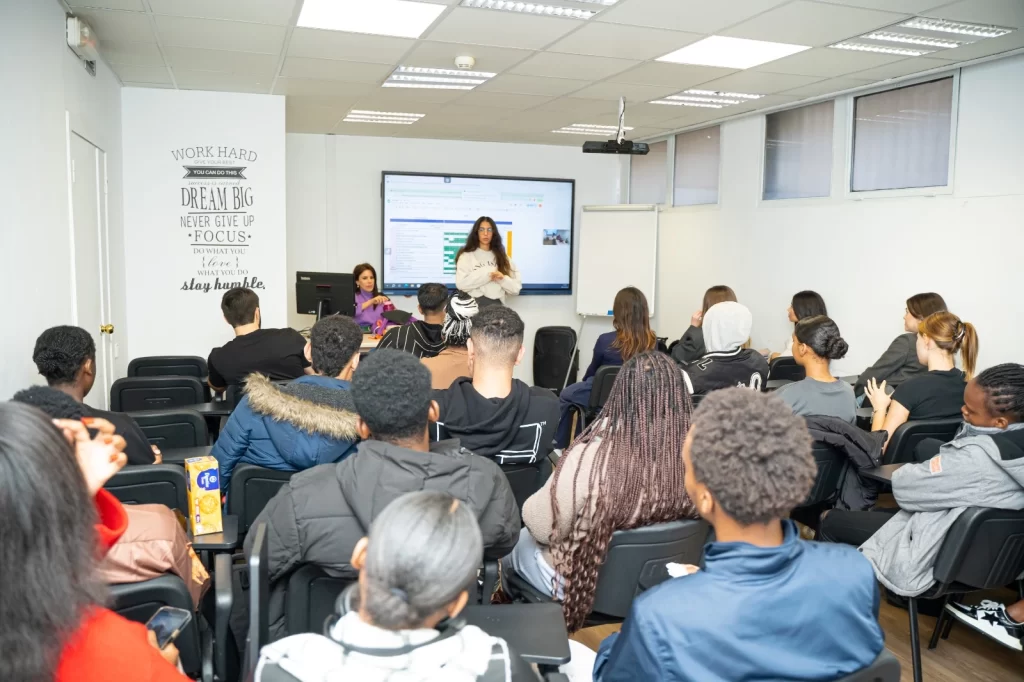The concept of a university degree, particularly long-winded undergraduate programs, has been a cornerstone of higher education for centuries. However, in recent years, questions about the relevance of traditional degree programs have been increasingly raised. With the rise of online learning platforms, vocational training, and shorter, more specialized courses, many argue that the traditional bachelor’s degree is becoming obsolete. ‘’This discussion is especially relevant in the context of the Bachelor’s program in Spain, where educational institutions are grappling with evolving student expectations and the demands of a rapidly changing global job market,’’ says Dr Marc Sanso, academic head of Aspire Business School, Barcelona.
College has changed a great deal in the last 25 years. For one thing, we have an urgent crisis of college affordability. According to a published story in Harvard Business Review: ‘’Due to skyrocketing tuition, the average student in the U.S. now graduates with about $30,000 in student loans. Simultaneously, colleges are facing crises of completion — only about 50% of matriculating students ever complete a degree — and employability. More than 40% of new and recent graduates are underemployed in their first job. And for those who are underemployed in their first job, two thirds are underemployed five years later, and half are underemployed a decade later.’’
Europe is not too different either.
Adam Zielinski, a celebrity software developer and blogger writes: ‘’Have you ever wondered why universities were created in the first place? To me, it was an act of creative rebellion. A group of students in 11th century Italy had a knowledge problem1. They wanted to learn, but the only two knowledge mediums in existence, scholars and manuscripts, were controlled mainly by the church and only shared with the wealthy males and future monks. They were neither. Lacking other options, they created one by finding a scholar willing to home-school them as a group for a reasonable price. Then the news spread and brought more students, more money, better teachers, books, lecture halls, and legal status. That organization still exists today and is known as The University of Bologna:’’
The world is no longer the same.
Adam Zielinski adds: ‘I grew up in a world where I could work as a software developer, manager, data scientist, and even co-founded a VC-backed startup without as much as a Bachelor’s degree. During my time, skills open more doors than diplomas. Knowledge travels with the speed of light, reaching anyone carrying a smartphone. Everyone has free access to courses from MIT, Stanford, Harvard, and thousands of independent teachers. Quality education is so abundant I don’t even have to tolerate lousy teaching or selective admissions.”
In 2010, the year following the Great Recession, college and university enrollment in the United States reached an all-time high. However, in the decade since, a widespread narrative has taken hold that the value of a college degree is in steep decline. With the rise of well-funded educational technology companies—especially the launch of massive open online courses (MOOCs)—speculation grew about the disruption of American higher education. The idea that online badges would soon replace traditional diplomas became a hot topic. Renowned business theorist Clayton Christensen even predicted that within 15 years, half of all colleges could face bankruptcy, while others declared the traditional degree was on the verge of extinction.
The Rise of Alternative Learning Models in Bachelor’s Program in Spain
One of the strongest arguments for the decline of traditional undergraduate programs is the proliferation of alternative education models. Online learning platforms such as Coursera, Udemy, and edX provide access to high-quality courses from top universities and industry professionals. These platforms offer flexible, short-term courses that allow learners to focus on specific skills without the commitment of a multi-year degree program. As Dr. P. R. Datta, executive chair of the Centre for Business & Economic Research (CBER), puts it: “The rapid rise of online learning platforms is a testament to the changing needs of learners. People are no longer willing to invest years in a university degree when they can acquire job-ready skills in a matter of months.”
Additionally, vocational and skills-based training programs have gained traction, particularly in industries such as technology, healthcare, and design. These programs offer practical training that prepares individuals for specific roles, often at a fraction of the cost of a traditional university degree, such as a popular bachelor program in Barcelona. In Spain, vocational programs have become particularly popular among students who are seeking immediate employment rather than pursuing academic theory. According to Dr. Rajat Baisya, a global management consultant and former dean of IIT Delhi, “Vocational training is rapidly becoming a viable alternative to traditional degrees, especially in countries like Spain, where the job market is demanding skills over academic credentials.”
The Skills Gap and the Need for Shorter, Specialized Modules in Bachelor Program in Barcelona
Another key argument against long-winded undergraduate programs is the growing gap between what universities teach and the skills that employers demand. According to a 2023 survey conducted by the World Economic Forum, nearly 50% of employers believe that traditional university degrees do not adequately prepare students for the workforce. As industries evolve, particularly in fields such as technology and digital marketing, the skills required to succeed in these sectors are changing at a rapid pace. Traditional degree programs, which often span three to four years, struggle to keep up with these changes.
For example, in the Bachelor program in Barcelona, institutions like C3S Business School are attempting to address this issue by offering more flexible and interdisciplinary curricula. Hiren Raval, CEO of C3S Business School, explains: “We are moving away from the one-size-fits-all model of education and focusing on modular programs that allow students to develop the specific skills they need. This is what the job market is demanding, and we are adapting to meet that demand.” Despite these efforts, the length and structure of many traditional undergraduate programs still leave graduates with outdated knowledge by the time they enter the workforce.
The High Cost of University Education in the Level of Bachelor’s Program in Spain
The rising cost of higher education is another factor contributing to the potential decline of traditional degrees. In countries like the United States, student debt has reached crisis levels, with many graduates struggling to repay loans for years after completing their degrees. In Europe, while tuition fees are generally lower, there is still a growing awareness that a university education may not provide the return on investment that it once did. Michael Taylor, Registrar at the London College of Business, adds: “The cost of a university degree, particularly a long undergraduate program, is becoming increasingly difficult to justify. Students are asking themselves whether they really need to spend three or four years in a classroom when they could be earning a salary and gaining experience in the workforce.”
Even in Spain, where tuition fees for the Bachelor program in Spain are relatively affordable compared to other countries, there is growing interest in alternative, shorter educational pathways. As students weigh the costs and benefits of a university education, many are opting for shorter, more affordable programs that provide immediate value in the job market.
The Demand for Lifelong Learning as opposed to Bachelor’s Program in Barcelona
The traditional model of higher education assumes that a university degree is the final step before entering the workforce. However, this model is increasingly at odds with the realities of modern careers, where continuous learning and skills development are essential. According to Dr. Fernando Velasquez Villalba, a senior faculty at C3S Business School, “The concept of lifelong learning is becoming more relevant in today’s economy. Workers need to continuously upgrade their skills to remain competitive, and this is something that traditional degree programs do not adequately address.”
In response to this demand, many institutions, including those offering a Bachelor program in Barcelona, have begun offering micro-credentials and certifications that allow students to upskill throughout their careers. These shorter, targeted programs provide immediate value and can be completed alongside full-time employment, making them an attractive alternative to traditional degrees.
Despite the rise of alternative education models and the arguments for the decline of traditional degrees, there are still compelling reasons to believe that university degrees, particularly undergraduate programs, will remain relevant.

The Value of a Broad-Based Education to be a part of in Bachelor’s Program in Spain
One of the key benefits of a traditional undergraduate program is the opportunity for students to receive a broad-based education. Unlike vocational or skills-based training, a university degree provides students with a foundation in critical thinking, problem-solving, and communication skills—abilities that are highly valued across industries. Dr. Daba Chowdhury, an associate professor at Christ Church Business School, University of Canterbury Christchurch explains: “While technical skills are important, the ability to think critically and solve complex problems is what sets university graduates apart. This is something that can only be developed through a comprehensive, multi-year education.”
In the Bachelor’s program in Spain, many universities continue to emphasize the importance of a well-rounded education. For example, institutions like the University of Barcelona offer interdisciplinary courses that allow students to explore a wide range of subjects, from the humanities to the sciences. This approach not only prepares students for specific careers but also equips them with the intellectual flexibility to adapt to changing industries.
The Credentialing Function of University Degrees is the Big Plus of Bachelor Program in Barcelona
Another important role of university degrees is their function as credentials in the job market. While alternative education models may provide valuable skills, a traditional degree is still seen as a mark of credibility and achievement by many employers. Dr. Yelena V. Smirnova, a faculty member at C3S Business School adds: “Employers still look for candidates with university degrees because they see them as a signal of discipline, perseverance, and the ability to work within a structured environment.”
In the Bachelor program in Spain, many institutions continue to maintain strong relationships with local businesses and industries, providing students with internships and job placements that enhance the value of their degrees. This connection between universities and the job market is a key reason why traditional degrees continue to be valued by both students and employers.
The Social and Networking Benefits of University Education as gained in Bachelor Program in Spain
Beyond the academic and professional benefits, university education also offers important social and networking opportunities. For many students, attending a university is a formative experience that allows them to build lifelong relationships, engage in extracurricular activities, and develop a sense of identity and purpose. Prof Philip Mayer, a London-based faculty member at Regent’s University, points out: “The university experience is about more than just acquiring knowledge. It’s about personal growth, social development, and building a professional network that will be invaluable throughout one’s career.”
In cities like Barcelona, universities are often hubs of social and cultural activity, attracting students from around the world. This diversity enriches the student experience and provides valuable opportunities for networking and collaboration. For example, students in the Bachelor program in Spain often have access to international conferences, workshops, and study-abroad programs that enhance their global perspective.
The Flexibility of Modern Degree Programs as witnessed in the C3S Bachelor Program in Barcelona
Finally, it’s important to note that many universities are evolving to meet the challenges posed by alternative education models. In Spain, institutions offering a Bachelor program in Spain is increasingly incorporating flexible, modular programs that allow students to tailor their education to their specific interests and career goals. Prof Renato Valer, a faculty member at C3S Business School, explains: “We recognize that students today want more flexibility in their education. That’s why we offer modular programs that allow them to focus on the skills and knowledge that are most relevant to their careers.”
In addition, many universities are embracing online learning and hybrid models that combine the benefits of traditional education with the flexibility of modern technology. This approach ensures that students still receive the depth and breadth of a university education while also gaining practical, job-ready skills.
How the Debate Must be concluded on Bachelor Program in Spain
While the rise of alternative education models, the skills gap, and the high cost of university education have raised legitimate questions about the future of traditional degrees, there are still strong arguments for their continued relevance. Particularly in the context of a Bachelor program in Spain, institutions are adapting to meet the changing needs of students and the global job market. By offering flexible, interdisciplinary programs and maintaining strong connections with industry, universities are ensuring that their degrees remain valuable credentials in an increasingly competitive world. Ultimately, the future of higher education may involve a blend of traditional and alternative models, providing students with the best of both worlds.




